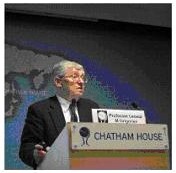South Stream: A Big Project? Now?
Κύρια σημεία από την ομιλία (7.11.2013) περί South Stream του Leonid Grigoryev, Προϊστάμενου του Κέντρου Ανάλυσης της κυβέρνησης της Ρωσσίας.
The global economic crisis had been perhaps the most painful one in the last 60 years or so, according to Leonid Grigoryev, Chief Advisor, Head of Analytical Centre of the Government of the Russian Federation, who spoke at South Stream: The Evolution of a Pipeline in Ljubljana, Slovenia.
In that context he said of the South Stream natural gas pipeline project: “We should understand it’s not a normal situation to start a huge project. Normally, big projects are started at the end of the upturn.”
Mr. Grigoryev noted that the whole of Europe was presently economically stagnant, while the United States appeared to be coming out of the crisis, quietly outpacing Europe, which was mired in deep political turmoil.
Yet hope remained that Europe could and will recover, but a big project like South Stream could not be profitable in just a year or so. “It will pay not only in profits, but will pay environmentally, for people and help countries in the region (like Slovenia) push forward,” he said. “To start moving out of this recession is important.”
With the aid of a graph, he reminded those in attendance that the price of energy had increased in the last 40 years, as had commodity prices. Many countries in Europe, he showed, like Germany, were under the level of pre crisis industrial production.
Meanwhile, high global energy prices in a time of crisis meant, “that people are turning very much to coal, losing out on climate change. Asia’s energy balance is 70% reliant on coal.”
Mr. Grigoriev showed where Europe stood regarding CO2 emissions, that they had gone down 55% since the 1980s. However, with the price of coal down compared to that of gas, he pointed out that switching from coal to gas was very expensive. “It’s moving back to coal,” he remarked. “Coal import to Europe to Europe comes one quarter from Russia, one quarter from the United States, up 24% from the US.”
“After the crisis European gas consumption was reduced by roughly 50 bcm and was replaced by coal,” he explained. “As soon as anyone is back to thinking about the climate, or the price of carbon goes up, Europe will be switching back to gas. Plus, it’s impossible to get from oil to renewables in 10 years; it will take until 2040-50 to substantially reduce the usage of fossil fuels by the EU.”
He noted that many European countries had signaled their unwillingness to pursue renewables because of the economic crisis. Meanwhile, the deepest decline in stock prices could be witnessed in Europe’s electricity sector.
The elasticity of gas consumption in OECD countries as a percentage of GDP, he said, was about 1%. “The world is moving to a gas economy, not because of ‘Gazprom propaganda’, but because it’s the reality of inter fuel competition.”
In terms of the environment, he recalled the WWF’s very rigid position on drilling for oil in the Arctic, but that gas was not creating substantial environmental problems.
Regarding the “banana” sentiment in Europe – “build absolutely nothing anywhere near anyone” – Mr. Grigoriev said, “The completion of the infrastructural system of Europe in terms of water, gas, electricity is probably for our generation in the next 30-40 years, but the infrastructure is not completed,” he commented.
Mr. Grigoriev added: “It’s very hard to discuss cost investment and energy benefits against endless political separations. My suggestion is to divide these into two slices: this is politics, this is energy, and work down the road.”
Πηγή: Natural Gas Europe
http://www.naturalgaseurope.com/south-stream-gas-dialogues-slovenia-leonid-grigoryev


